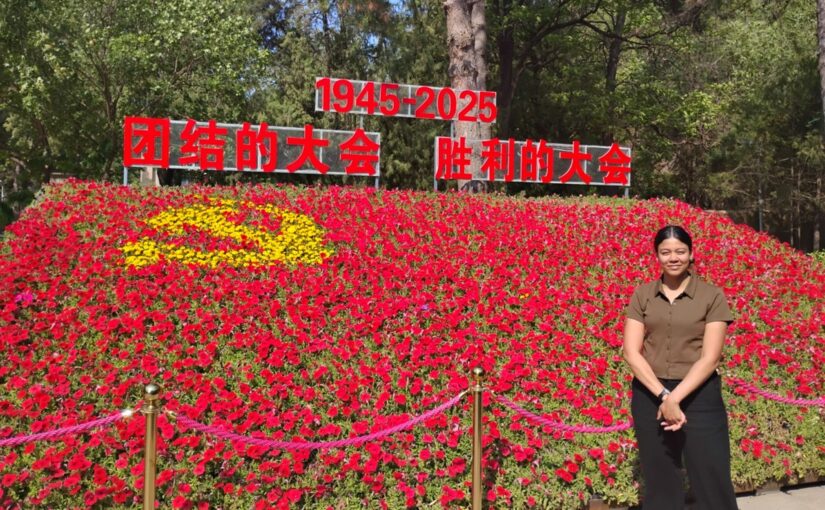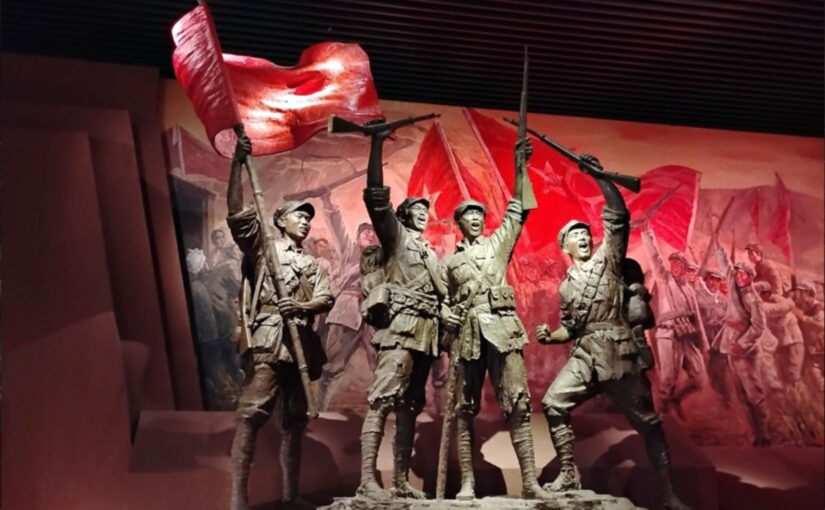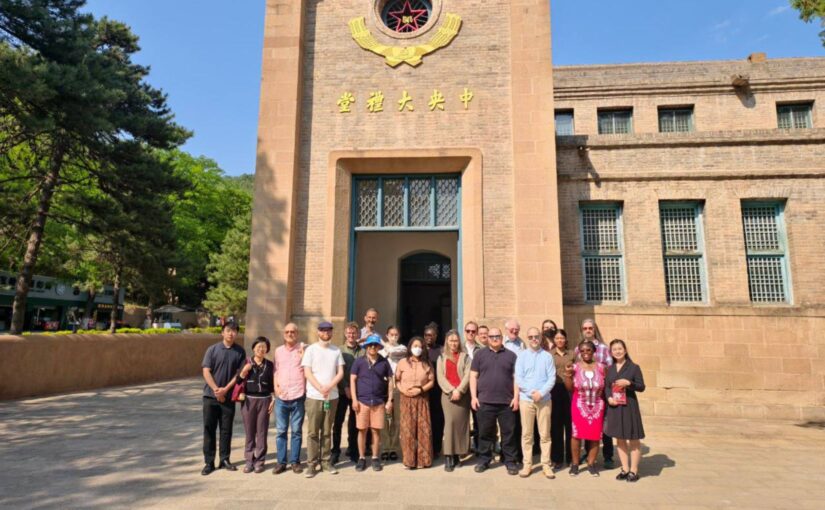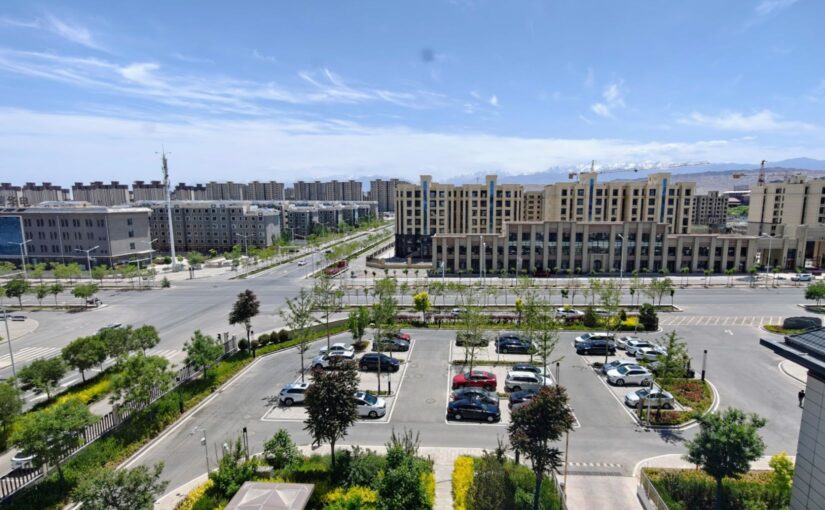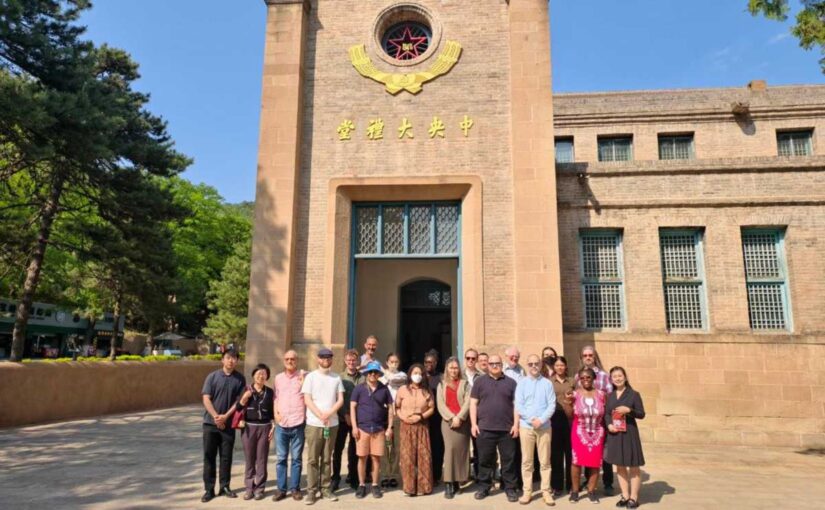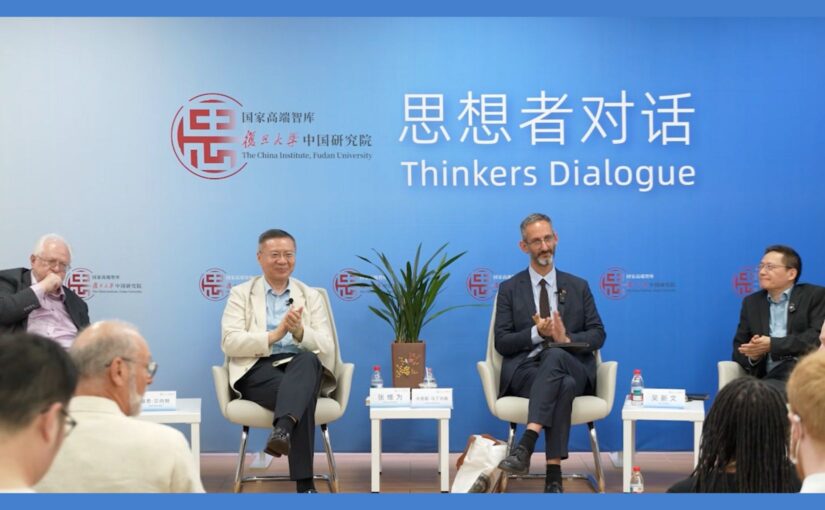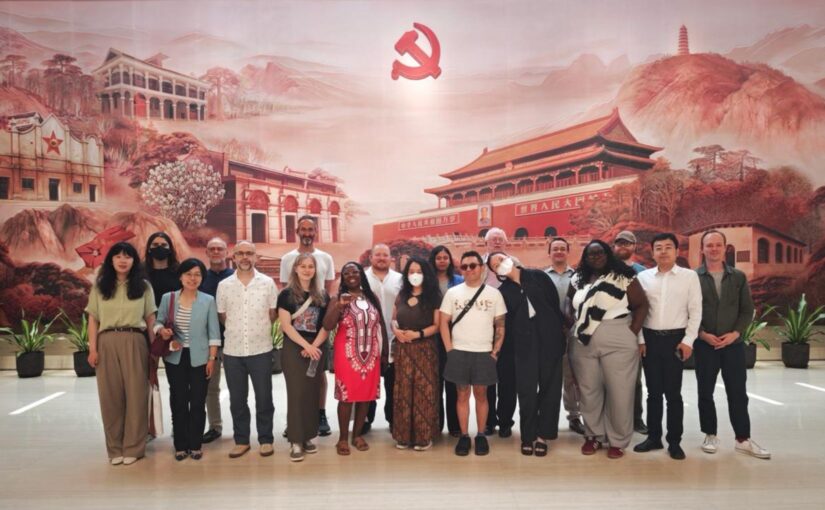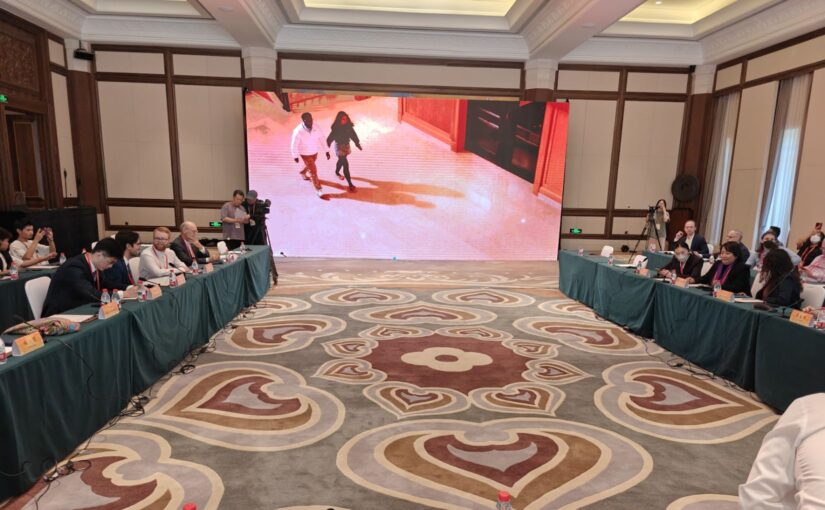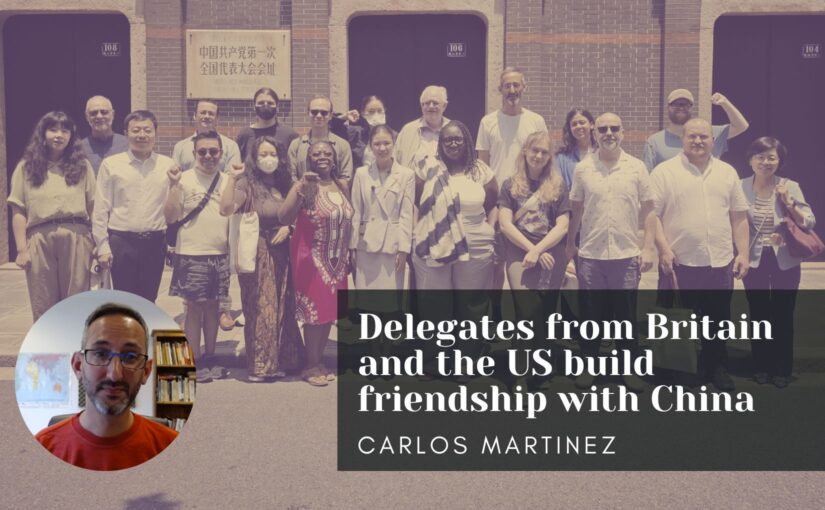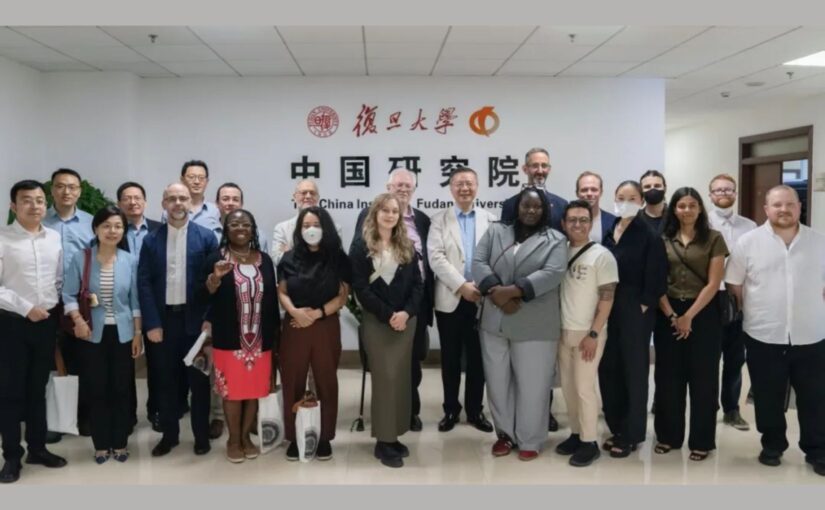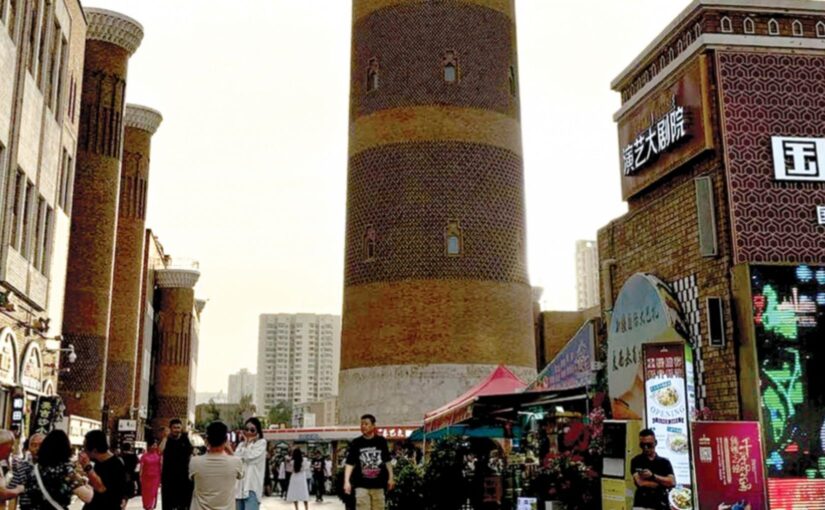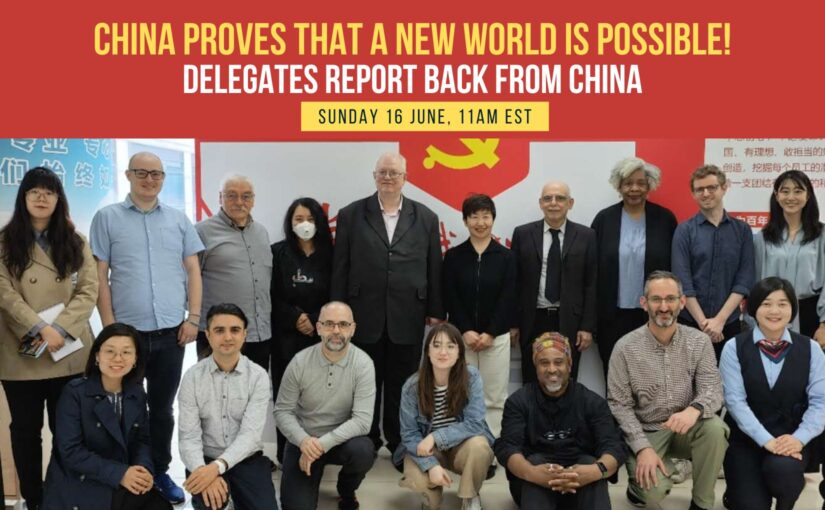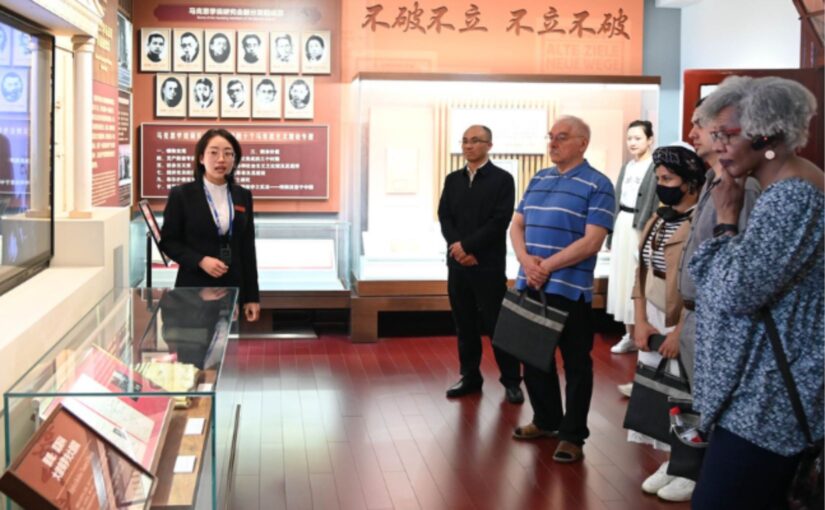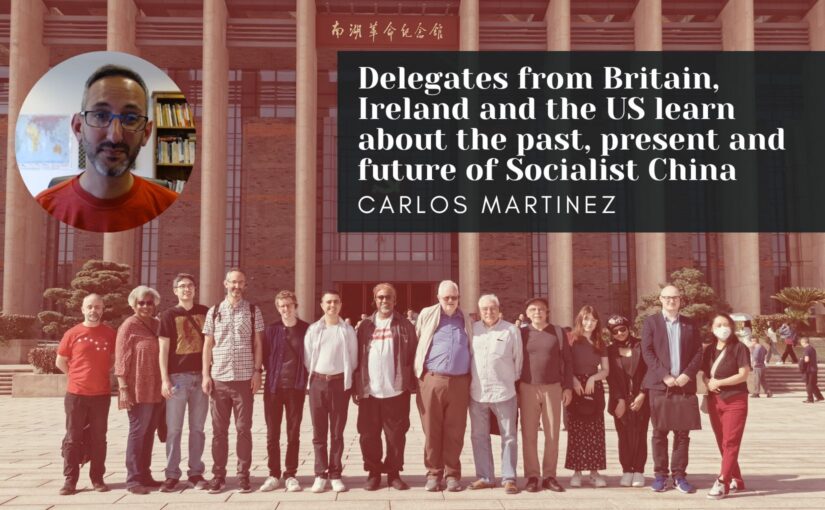We are pleased to republish below the Spanish translation of Freedom Road Socialist Organization Central Committee member Sydney Loving’s interview in FightBack News, in which she reflects on her experiences of the 2025 Friends of Socialist China delegation.
Nos complace republicar a continuación la traducción al español de la entrevista concedida por Sydney Loving, miembro del Comité Central de la Organización Socialista Freedom Road, a ¡Lucha y Resiste!, en la que reflexiona sobre sus experiencias con la delegación de Friends of Socialist China de 2025.
Noticiero ¡Lucha y Resiste! se sentó con Sydney Loving, participante de la delegación de Amigos de China Socialista, que recientemente regresó de una visita de diez días a cinco ciudades en China. De bases revolucionarios a ciudades de alta tecnología y desarrollo verde, la delegación presenció de primera mano el poder del socialismo a levantar las vidas de la gente. Loving es miembro del Comité Central de la Organización Socialista Camino de la Libertad.
¡Lucha y Resiste!: ¿Cómo llegaste a China? ¿Cuál fue el propósito del viaje?
Sydney Loving: La delegación fue organizada por Amigos de China Socialista, un proyecto político dedicado a fortalecer la comprensión y apoyo para China según la solidaridad y la verdad. Yo representé la Organización Socialista Camino de la Libertad, y la delegación incluyó la gente de la Alianza Negra por la Paz, Mundo de Obreros, Internacional Progresista, Partido Comunista de Britania Liga de Comunistas Jóvenes, la Alianza de Liberación Negra, Libros Iskra, y otros.
Fuimos invitados por la Red China de ONG de Intercambios Internacionales, y durante 10 días visitamos Xi’an, Yan’an, Dunhuang, Jiayuguan y Shanghái.
Durante nuestro viaje a una variedad de lugares, tuvimos la oportunidad de descubrir cómo China está construyendo el socialismo, los avances increíbles que han hecho en 76 años de construcción socialista, y tuvimos diálogos maravillosos sobre cómo podemos rebatir mejor las narrativas negativas y las mentiras estilo Guerra Fría con las que estamos bombardeadas dentro del oeste. Al final, lo que encontramos fue un país encabezado por un partido político con una visión de futuro, con una meta que crea un mejor futuro para todos.
¡Lucha y Resiste!: ¿Cómo describirías el camino de desarrollo de China?
Loving: Para entender verdaderamente lo extraordinario que es el desarrollo de China, hay que entender la historia y cómo fue la vida anterior para la mayoría de la gente. Antes de la revolución en 1949, China fue totalmente devastada por el imperialismo y la ocupación extranjera, feudalismo brutal, las hambrunas provocadas por el hombre, el caudillismo y más. La expectativa de vida en las áreas rurales era tan baja como 24 años. En Xi’an fuimos a unos sitios históricos antiguos, y los generales de terracota y las estatuas de mujeres nobles estaban rollizos – porque la hambruna masiva era una característica de la sociedad por siglos. Entonces, el socialismo tenía que superar todo esto.
Fuimos para Yan’an, que fue verdaderamente la cuna de la revolución de 1935 y 1947. El Ejército Rojo se reagrupó allá después de la Marcha Larga, y el PCCh [Partido Comunista de China] tuvo el 7mo Congreso Nacional, (16 largos años después del 6to Congreso, porque estaban luchando contra el imperialismo japonés y el KMT) en el cual el Pensamiento Mao Zedong fue cristalizado y adoptado. Ellos pelearon contra el dogmatismo y tomaron la decisión de ser el partido de las masas de la gente China. Cuando construyeron las estructuras políticas y eligieron representantes al Congreso, tenían un sistema de platos hondos y frijoles para las personas que no podían leer para votar por sus candidatos.
Ahora, 76 después, vimos un país que es la economía más grande del mundo medido por Paridad de Poder Adquisitivo. Incluso en las ciudades más pequeñas son tecnológicamente avanzadas y cada día más verde, la expectativa de vida es de más de 78 años, y claro donde más de 800 millones de personas han salido de la pobreza extrema – y no solo estamos hablando en términos de cantidades de dólares. Estamos hablando de alimentación, ropa, vivienda, electricidad y agua, atención médica y educación garantizadas.
El capitalismo no es capaz de cumplir esa clase de proyecto. Lo lograron con el planeo central y la movilización en masa. Cada ciudad que visitamos mostró cómo el Partido Comunista está guiando el desarrollo que prioriza a la gente primero.
¡Lucha y Resiste!: ¿Cuáles diferencias notaste en la vida cotidiana?
Loving: Se siente sinceramente diferente a las ciudades en los EE. UU., incluso nuestras ciudades más grandes. Las calles están limpias, caminables, y bien ordenadas a pesar de lo pobladas que están. Hasta el punto de que las madres y sus hijos simplemente caminaban tras cada intersección, con confianza de que los carros tenían que pararse. Muchos vehículos y cosas son diseñados con consideración a las necesidades de los viejos, los niños y los obreros. Aun en uno de los hoteles, los trabajadores se reunían en la plaza para hacer baile/ejercicio por las mañanas. Fue verdaderamente tranquilo pero animado, con parques y jardines en todas partes, y muchas actividades gratuitas y acceso a la cultura y a sitios históricos.
En Xi’an y Dunhuang en particular vimos como miles de años de civilización están siendo preservados como parte de la identidad viva de la gente. Y ya que el turismo interno es tan importante, los museos y sitios estaban llenos de niños, ancianos y familias. Para mí, me quedó claro que mantener el pueblo como dueño de su historia y su cultura es parte fundamental del espíritu revolucionario.
Y no como las ciudades de los EE. UU., no vimos casi ninguna falta de vivienda. En diez días, viajando por cinco ciudades, solo vi a una persona pidiendo limosna en la calle con un código QR en el fondo de una olla. Compáralo con San Francisco o Nueva York, donde hay barrios enteros de campamentos.
Además de eso, la tecnología fue increíble. Desde pequeños robots que toman el elevador para entregar comida a tu cuarto de hotel a los aeropuertos donde solo te paras frente a una cámara y te muestra toda la información de tu puerta de embarque y vuelo. Nuestros anfitriones nos avisaron contra tomar el tren bala porque nosotros los occidentales somos muy lentos con tanto equipaje y seguro íbamos a llegar tarde, pero el tren normal también fue genial.
¡Lucha y Resiste!: Fuiste al noroeste, una región bastante pobre de China. ¿Qué fue lo que más notaste?
Loving: Si, fuimos a la provincia de Gansu, en el borde del desierto de Gobi, una de las partes más empobrecidas de China. Pero realmente nos impresionó lo que están haciendo allí.
En Jiayuguan, visitamos JISCO, una empresa siderúrgica estatal alrededor de la cual los obreros construyeron la ciudad entera en los años 1950s. Hoy tiene una cobertura verde de 42%, con estanques y parques — y recuerda que esto es el desierto Gobi. Es un testamento del nivel de desarrollo de las fuerzas productivas que ahora JISCO incluso tiene una granja lechera y una vinatera con la bodega de vino techada más grande de Asia (sí, probamos el vino — delicioso). También recorrimos la planta de poder solar de sal fundido de Dunhuang, que puede almacenar energía por la noche y un centro de control con IA para una red eléctrica inteligente que ayuda a reducir la producción de carbón en toda la providencia. Le preguntamos a un trabajador allí cuál es la diferencia tecnológica entre cómo funciona su red eléctrica y la de EE. UU., y modestamente nos dijo: “Bueno, nuestra red nunca se cae”. Desafortunadamente, eso me hizo reír – siendo de Texas.
Hay un gran énfasis en la modernización ecológica. Realmente están transformando el desierto en un lugar habitable y sostenible. Es un testamento de cómo van juntos el alivio de la pobreza y el ambientalismo bajo el socialismo.
China también está demostrando que la tecnología no es inherentemente anti-humana. En Shanghái fuimos a una fábrica de robótica en donde demostraron los avances en la cirugía e industria, y una fábrica de Lenovo donde mostraron cómo colaboran con el sistema escolar para llevar tecnología avanzada a escuelas rurales. La diferencia está en quién controla la tecnología, bajo qué sistema y para qué propósito.
Para China, un desarrollo que deja gente atrás simplemente significa un fracaso. Por eso se enfocan en equilibrar el desarrollo de las regiones, impulsando el occidente y el noroeste en lugar de permitir que la riqueza se concentre solo en las costas. Así, tras el éxito de los masivos proyectos de aliviar de la pobreza – que ni la ONU puede negar – la siguiente fase es la “prosperidad común”.
¡Lucha y Resiste!: ¿Cuál fue el papel del Partido Comunista en la vida cotidiana?
Loving: El Partido Comunista estuvo en todas partes. Digo acaban de celebrar haber alcanzado 100 millones de miembros. Aldeas, hospitales, escuelas y fábricas tienen ramas del Partido. En Jiayuguan pasamos por uno de los “Centros del Partido,” donde nuestros guías nos dijeron que las personas pueden ir a hacer preguntas o pedir ayuda de los cadres, hasta el cuidado de los niños.
Continue reading Entrevista: Como China está construyendo el socialismo

